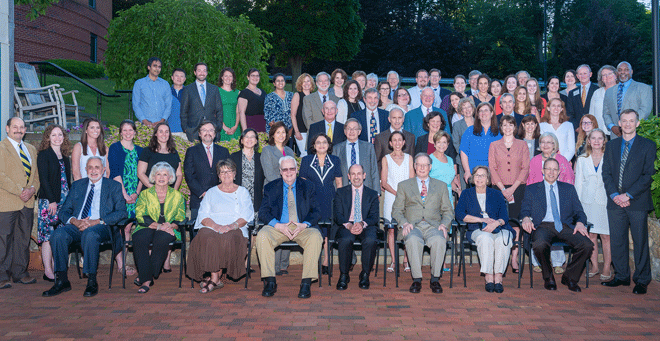 |
|
|
The Meyers Primary Care Institute comprises researchers and medical educators who are embedded throughout the health care delivery system. Here, the group gathers for a 20th anniversary celebration. |
For two decades, the Meyers Primary Care Institute (MPCI) has quietly pursued an ambitious agenda to improve population health through innovative research and educational initiatives.
On July 1, the Institute, a unique partnership between UMass Medical School, Fallon Health and Reliant Medical Group, celebrated its 20th anniversary. Launched with a $2 million investment by its sponsors in 1996, the institute and its multidisciplinary faculty have since been awarded more than $60 million in external funding and its researchers have published more than 1,200 papers in scientific and medical journals, including the New England Journal of Medicine and JAMA.
“We’re influenced by what the nation cares about, what providers care about and, importantly, by what our patients care about,” said Jerry H. Gurwitz, MD, the Dr. John Meyers Professor of Primary Care Medicine, MCPI founding executive director and chief of the Division of Geriatric Medicine at UMMS. “We think of ourselves as researchers and medical educators who are embedded in the health care delivery system. In that way, we have the opportunity to see the world of health and health care through a different lens; we’re able to see things the way they really are and that drives our research agenda.”
Over the past 20 years, the institute’s multidisciplinary team of clinical and academic researchers has focused on several key areas including patient safety, communication, health information technology, epidemiology of chronic disease, medication safety, quality improvement, comparative effectiveness research and implementation science.
Currently, the institute, together with Reliant Medical Group, is part of a national study on reducing the risk of fall-related injuries in older adults. The research study, funded by the Patient-Centered Outcomes Research Institute (PCORI) and the National Institute on Aging will ultimately enroll 6,000 participants.
The special focus on the care for older adults extends beyond the research realm. With a shortage of geriatricians in the country, the institute hosts an annual event for chief residents across the different specialties from throughout Central Massachusetts to teach them about the principles of caring for older adults so that they, in turn, can teach their own trainees, including medical students from UMass Medical School.
Emphasis on communication between the patient and the provider is another key area that has evolved over the past 20 years and Dr. Gurwitz said research at MPCI has had a national impact on encouraging dialogue about sensitive issues including medical errors. An example of this is an ongoing study lead by Kathleen Mazor, EdD, associate professor of medicine and assistant director of the MPCI, that focuses on detecting, addressing and learning from patient-perceived breakdowns in care.
From a population perspective, MPCI researchers, with funding from the FDA and in partnership with Fallon Health, are also working to better understand what happens to people who are prescribed opioids and how they’re affected over time.
“We’re continually working to focus our efforts on issues that have a chance to impact the health of populations and communities. That’s what we do,” said Gurwitz.
“I think the medical school has to be congratulated for making the investment in something like this that has lasted 20 years. In many ways it was visionary,” he said.
For additional information about MPCI, visit http://www.umassmed.edu/mpci/.
Related story on UMassMedNow:
Meyers Primary Care Institute at UMMS part of $30 million national falls study